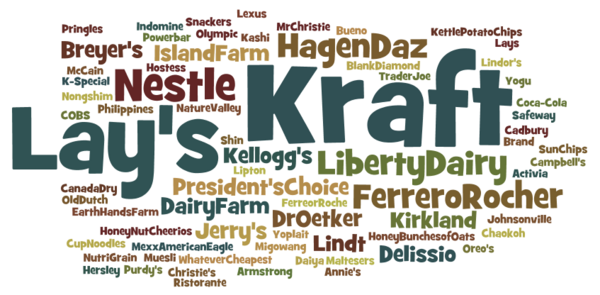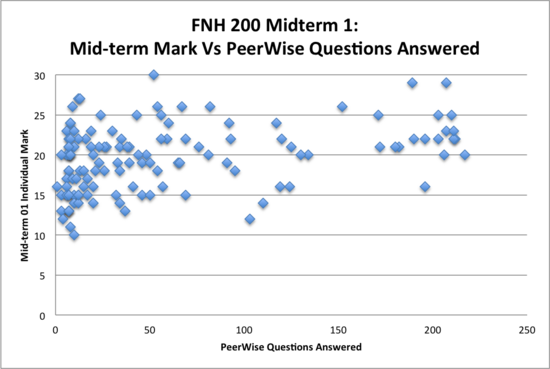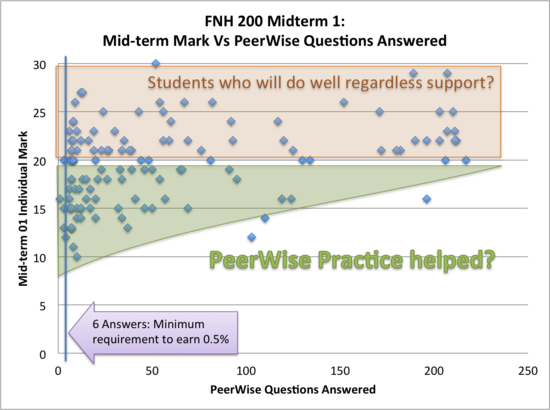Course:FNH200/2012w2/Lecture Notes
THIS CLASS IS AMAZING!!!
December 2012, Using PeerWise
To access PeerWise for the first time as an individual, you will need to do the following:
- Go to http://peerwise.cs.auckland.ac.nz/at/?ubc_ca
- Click Register, on the right bottom corner
- Pick a username, preferably a name not associated with your real name. For the purpose of this course, some suggestions include 'foodie', 'foodguard', 'madscientist', 'chocolatier', 'listeriosis', etc.
- Pick a password, any password you commonly use will do
- Enter your PeerWise Course ID = 6902
- Enter your individual identifier, as posted on your Vista Gradebook
You need your individual login/ID to answer questions
To access and author question as a team, repeat above steps, except that you will need to create a team name, team password, and a team identifier (will be posted by 3rd week in January)
Wednesday, January 2, Syllabus & Lesson 1
See you in class on Wednesday!
Please bring your $ 4.00 course fee.
We went over the course syllabus, part of Lesson 1, did a quick exercise so I get to know you more), and pay your $ 4.00 fee!
Near the end, each student filled out an index card with the following information:
- Name (first and last name)
- Academic Standing (eg. Third Year in FNH)
- Favourite Foods (eg. Frozen Pizza)
- Favourite Brands (eg. Delissio)
- Expectation of this course
- Something about you that you like me to know
If you didn't attend class on Jan 2, please fill out an index card. I like to know who you are, though I will not have time to add your contribution to the word clouds below. Thanks.
Here is a graphic representation of the academic background of students in FNH 200 this term:

Students in FNH 200 like these foods:

And they like these brands:

Friday, January 4, CDN Food Systems, Stats Canada Link
We continued our discussion on the Canadian food systems in Lesson 1.
We ended our class with a prediction of recent food consumption pattern. Here is what we predicted:

Here is the latest link to the Food Statistics 2009 Highlight page. Please scan through the page and pay special attention to the first bullet point:
http://www.statcan.gc.ca/pub/21-020-x/2009001/aftertoc-aprestdm1-eng.htm
I also created a summary of food available pattern in the last several decades. See table on left and double click the image to get a larger view. You do not need to know the exact data.

Washington State Apples: Controlled Atmosphere Storage webpage
http://www.bestapples.com/facts/facts_controlled.aspx
Monday, January 7, Food Trends in 2009, Lesson 02 Food Colloids
We reviewed food trends.
We spent most of the class on food colloids: sol, gel, emulsions, and foams. I gave out some jello samples and attempted to foam some milk to illustrate foaming.
Wednesday, Jan 9, Carbohydrates
We began with some marshmallows.
The rest of the class was all about the many forms of 'sugars'. We watched a video on the making of sugar glass:
- I finally know how to embed a youtube video on UBC wiki!!!***
We finished the class with some sour lemon drops and soft caramel.
Questions from Students
A couple students stayed behind class and asked more questions.
1) How does high fructose consumption (particularly through high fructose corn syrup) affect our health?
A good question (because I don't know the answer and never thought of this). I should actually worry about this as my daughter LOOOOOOVES fruit and she would have a higher-than-usual intake of fructose!!!
After doing some quick reading on the internet, I no long worry about any negative effect on high fructose consumption.
However, I'm still interested in reading more. Could the student who talked me on Wednesday come talk to me again? I like to learn more about the 'acid' you mentioned. Thanks!
2) Maillard browning reaction: how does it really work?
You may want to visit an old course page of FNH 301 (Food Chemistry) to find out more details of the chemical reactions of Maillard browning reaction:
http://www.landfood.ubc.ca/courses/fnh/301/brown/brown_prin.htm
Friday, Jan 11, functionalities of FATS and proteins in food
We discussed the functionalities of fats and proteins in food.
When it comes to fats, think about croissants , especially 'pain au chocolat' and french fries.
When it comes to protein functionalities, I like you think about the roles of milk proteins in milk, latte, and cheese.
Monday, Jan 14, Trans-fat
Try to answer this question:
How do we convert liquid veggie oils to a solid margarine?
Additional and optional information:
Trans-fat in oils before and after deep-frying: http://www.sciencedirect.com/science/article/pii/S0308814609002775
Becel Centre for Heart Health (pay attention to the ingredient list of different products): http://www.becel.ca/en_ca/products/
Trans-fat regulation in food service establishments in BC: http://www.restricttransfat.ca/bc_trans_fat_regulation.html
Organic chemistry of the isomerization of unsaturated fats: http://chemwiki.ucdavis.edu/Organic_Chemistry/Organic_Chemistry_With_a_Biological_Emphasis/Chapter_13%3A_Reactions_with_stabilized_carbanion_intermediates_I/Section_13.2%3A_Isomerization_reactions#13.2C.3a_Alkene_isomerization_in_the_degradation_of_unsaturated_fatty_acids
Wednesday, Jan 16, Water Water Everywhere
Friday, Jan 18, Aroma, Colour, Vitamins and Minerals
After we discussed aromatic compounds, colourants, vitamins and minerals in foods. We started a quick introduction on sugar substitutes. I asked the class to read the labels of a few common sweeteners that can be found at coffee shops.
Mid-term Teaching Feedback (not completely summarized yet as of Jan 18)
I then asked for your feedback on my teaching. I asked you to complete the following two sentences:
- I'm still confused about ____________________.
- I like/don't like your teaching because _____________________.
Here is a summary of your feedback and my responses:
| I'm still confused about... | My responses: |
|---|---|
| [Blank] x 4 | Really? Don't hesitate to let me know when you are confused. :) |
| what is expected; depth of question x 3 | I will go over the learning outcomes of each lesson in the future. I also showed a couple sample question on Monday, Jan 21 |
| colloidal dispersion: gels, emulsions, foams, etc x 3 | I briefly went over this on Monday. Please come see me. I found it easier to explain face-to-face rather than typing in front of a laptop. Please come see me. |
| what is required on the exam and what is optional. | Everything, except a few tables, will be considered to be on the exam. |
| fat part of Lesson 2 | Example |
| what is the core point of this course? Food processing? All the ingredients? | The focus of lessons 2 and 3 is on the ingredients. The second half of FNH 200 focuses on the processing. |
| adding triglyceride to margarine | Ummm... please make an appointment to see me. I'm very concerned when you say 'adding triglyceride...'. It would be easier to explain face-to-face. |
| introducing trans-fat in margarine | I will explain this in class again. |
| what do we need to know on nutrition labels? | You do not need to know nutritional labels yet. Labeling regulations will be discussed in Lesson 4. |
| chemicals in food that affect health. Sometimes too much details to know and I'm not sure which is the right concept we should study or understand | All of those included on the lesson pages |
| exactly what you want us to know from your slides | I don't use slides; I only show the wiki pages and I expect you to know almost everything on the wiki pages. |
| what kind of questions you want us to make for PeerWise | Multiple-choice questions |
| do I need to know everything in required readings? | No, I've changed 'required' readings to 'recommended' readings. |
| PeerWise; what kind of questions you want us to make for PeerWise | Multiple-choice questions and I hope that your teammates will be able to help you with PeerWise |
| when it comes to scientific names and structures of compounds since I'm a non-science students. | You don't need to remember the structure of the carbohydrate-related compound. I do expect you to know the differences among saturated, cis-unsaturated and trans-unsaturated fats. |
| protein functions | Gels, emulsion, foams and enzymes |
| group work | I understand that it is challenging to work with a group of complete strangers. I'm doing my best to help you bond with each other. Please trust me that if you maintain a positive attitude and show the willingness to share, you will do fine in your team. |
| do I need to know everything in required readings? | No, I've changed 'required' readings to 'recommended' readings. |
| some specific terminologies | Again, please come ask me. It's my job to help you understand and I love my job :) |
I like your teaching because:
- fun stories x 5
- videos x 2
- food samples x 8
- entertaining x 2
- [no reason provided]
- it leaves me a lot of interest in food processing
- relaxing (through tasting foods) while learning
- interactive x 4
- interact with everyone
- energy
- enthusiasm
- humour helps me remember
- relevant
- bubbly personality
- makes me crave chocolate croissants :)
- feel comfortable asking questions
- simplify the topics
| I don't like your teaching because... | My responses: |
|---|---|
| it sometimes can be not as productive, spending too much time on one topic. I only want to know and learn what we have to learn for this course content. | Please let me know which topic I spent too much time on. FNH 200 is a foundation course. There is so much more about food and its science than what is discussed in FNH 200. I will try to find the right balance between 'covering' enough and 'stimulating' interests. |
| I have no idea what I'm learning. | Lesson 1 is an introduction to the Canadian food system and Lesson 2 provides a basic understanding of the chemical structure of foods. |
| You have lots of spelling mistakes and grammar errors. | Please help me correct them on the wiki pages. |
| Where to find all the class info... it would be easier to keep everything on just one site. | The course VISTA is THE site to visit. Due to the nature of the different activities I included for this course, I am using a few different web-based tools. I am very aware of the challenge and I try to make it clear on the course syllabus. |
| [I like your teaching, but] I prefer powerpoint slides. There isn't enough space on the wiki printouts to write notes. | Oh, I can help you find some space. |
| easily off topic; would like to follow more closely to testable materials | This is not quite my teaching style. I will try to stay close to core materials as much as possible. Oh... this is not going to be easy as there are so many interesting stories to share... |
| there aren't slide; I don't know what is super relevant for exams. | Concepts that I spent more time, related with more personal stories are concepts that I personally care about. The amount of time I spend on each topic forms a direct relationship with the relevance and chance of it being on the exam. |
| What you said is not from the notes | I like to include some personal stories in the lecture to make the course content more relevant. The wiki pages provides all that you need to know for the exams. |
Monday, Jan 21: Review
Sample mid-term exam questions:
When making Jell-o, the pectin in the Jell-o package dissolves in hot water and solidifies upon cooling, forming:
A. a liquid in polysaccharide emulsion
B. a liquid in solid gel
C. a gas in solid gel
D. a gas in solid foam
E. None of the above
Which image below shows a by-product during the conversion of liquid vegetable oil to spreadable margarine?
A. [Picture of a saturated fatty acid]
B. [Picture of a cis-unsaturated fatty acid]
C. [Picture of a trans-unsaturated fatty acid]
Wednesday, Jan 23: Sensory, Assignment and Research Project
We will discuss how we perceive food quality using our senses and how we test food quality using our senses.
We will go over the assignment and research project.
Friday, Jan 25: Team Meeting Day
Goals:
- Meet your teammates in person
- Meet your TA (Tina, Keely and Lennie)
- Discuss, finalize and contribute three questions (and answers) to PeerWise
- Brainstorm potential topic for the research project

Topic Selection Suggestions
- Choose something most members like
- Do a preliminary exploration on the topics before you commit to it
- Depth is better then breath; focus on an aspect of a particular topic rather than 'everything' on a topic
- Processing or making topics can easily become very shallow, as a recipe/cookbook with step 1, step 2, step 3 type procedures. Teams wanting to work on processing should remember to include some scientific explorations in your project
Once your team has come to a topic that is of interest to most member, remember to post on here: http://wiki.ubc.ca/Course:FNH200/Team_Projects
Suggested seating arrangement on Friday. After you 'find' everyone and if you wish, you could move to somewhere else, just notify your TA.
Monday, Jan 28: Assignment and Lesson 04
We went over the assignment and started thinking about food regulation (lesson 04).
Wednesday, Jan 20: Midterm and Group Exam
I thought it went really well. As you all know, I'm big on peer learning. I am excited to see how many of you engaged in discussion, and sometime heated debate!, during the group component of the midterm.
If you have any insight, feedback and comment, please let me know. Leaving your scribbles on a piece of paper on the table up front is all you need to give me feedback! Thanks in advance.
Midterm Stats
Individual average = 64% Group average = 90%
The most challenging questions are:
- Francois Nicolas Appert
- BUBBLY, moist bread
- What ARE in spreadable margarine?
- DESIRABLE protein functions
How Did PeerWise Help?


Friday, February 1: Grading
Egg Grading
Egg Grading: http://youtu.be/20inTZvPZP4
Egg Cracking: http://youtu.be/Fv8Hc7EbY4A
Beef Grading
Canadian Beef Grading Agency
Info provided by a Canadian beef campany
Monday, February 4: Regulation decision making
Finishing Lesson 4
Wednesday, February 6: Lesson 5 (and maybe 6)
Midterm 01 Grade
Many of you asked to change the way I calculate the final midterm grade, from 85/15 (group/individual) to 80/20? I have decided not to.
In addition to those reasoning I provided on Vista, I am also considering this data:

Afterall, I also 'believe' that it's those of you who actively engaged in the debate and discussion immediately after the mid-term benefitted most intellectually.
Peer Evaluation: ipeer.elearning.ubc.ca
Your formative peer evaluation will be available on Wednesday, Feb 6, at ipeer.elearning.ubc.ca, due on Feb 15.
The goal of this midterm evaluation is to give each member a channel to voice your appreciation/concern of your teammates midway through the project, before it's too late. Your evaluation and comment will be kept anonymous from each other. Grades and comments will be released on Feb 25.
Grades received from this formative evaluation will not affect your own final project grade; however, your own participation will impact your project grade.
Selling Homemade Canned Foods
We had a few questions regarding the selling of homemade canned foods. I couldn't find anything from BC (let me know if you found something), but there was a couple sites from Alberta:
http://www1.agric.gov.ab.ca/$department/deptdocs.nsf/all/agdex10001
Also, page 10 of this: http://www.calgaryhealthregion.ca/publichealth/envhealth/education/documents/Farmers_Market_Home_Study_Course_June_2012.pdf
Basically, one can only sell canned jam, jelly, pickles and relish.
Friday, February 8: Lesson 6 Thermal Processing
Food samples :)
BPA in Cans
Here is a survey of BPA in canned food in Canada: http://www.hc-sc.gc.ca/fn-an/pubs/securit/bpa_survey-enquete-can-con-eng.php
Wednesday, February 13: Graphs and Margin of Safety
We discussed Lesson 06
Friday, February 15: Low Temperature
Watch the video above and pay special attention to:
- The freezing technique
- The freezant
- Pasteurizing condition of the 'filling'
- Definition of homogenization of the ‘filling’
- Shelf Life and storage Instruction of the final product
This is also fun to watch! The first couple minutes are indeed packed with terminologies that we've explored in previous lessons. This is a good opportunity to review the many terms mentioned in the beginning of this clip.
Monday, February 25: Low Temperature Review
You may want to watch the first 90 minutes and fast forward to 4:30 min of this video:
Individually Quick Freeze:
Wednesday, February 27: Dehydrated Food Buffet
I like to invite you to bring some of your favourite dehydrated foods to class on Wednesday. You don't need to bring enough for the whole class, just a small sample for me to show the class and may be some for your neighbours. I don't expect you to spend money on this neither, but if you spent more than $5, bring a receipt and I am happy to pay you back.
What we consumed?
- Form informal groups with at least one computer/device
- List all dehydrated foods you've consumed in the last two days
- Group them by dehydrated methods
- Enter them on http://goo.gl/onxF3
Friday, March 1: Concentration Effect
What is concentration effect?
Week of March 4: Office Hours
A couple TAs have volunteered to host some office hours next week. Unfortunately, due to space limitation, the office hour will happen in Woodward Public Study Room 20B (in the basement). It's a bit out of the way for most Arts students. Sorry.
The hours are:
- Monday, March 4, 11 to 11:50 am
- Tuesday, March 5, 2 to 3 pm
- Wednesday, March 6, 1 to 3 pm
- Tuesday, March 12, 1 to 2 pm
Please kindly let us know if you plan to visit us during these office hours so that we can better manager our time together. Also, please let us know types of questions you may have.
Videos to watch:
Fermentation of soy sauce in two types of production facilities:
Small scale production
LARGE scale production
Wednesday, March 6: Cheese Making
Cheese making Cheese sampling Genetically modified foods
This is a pretty easy to follow clip, a bit funny and has all necessary science content needed for FNH 200
Friday, March 8: Team Meeting Day
- Team meeting day
- PeerWise question authoring day
Monday, March 11, Irradiation
http://www.globalnews.ca/video/index.html?v=G7Ru9AJcNtzdmwv3Gr0X7b8UzJ28FypU#health
Tuesday, March 12: LFS GRS Career Night

Wednesday, March 13
- PeerWise Answering
- Midterm Exam (individual and group)
Friday, March 15: Irradiation
This video below shows a very good animation of the food irradiation process:
http://www.globalnews.ca/video/index.html?v=G7Ru9AJcNtzdmwv3Gr0X7b8UzJ28FypU#health
Monday, March 18, Review - Midterm, Irradiation and Nutrient Retention
Feel free to view questions reviewed in class:
Wednesday, March 20: Toxicants in Foods and Listening to your concerns
We started Lesson 12 and had an active discussion on the midterm format.
|
News on Foodborne Illness
Monday, March 25: Parasite in fish and pink burger
I added a new piece of information related to sashimi:
Freezing fish at -20 oC for 7 days can eliminate larvae of Anisakis simplex from raw fish and prevent anasakiasis.
I also expect you to understand why it is okay to consume rare steak, but not pink burger.
Wednesday, March 27
Team project: wiki and video
A very straight forward and informative video on the basis of HACCP:
This is a very thorough video by Agriculture Alberta:
A concise introduction of HACCP by CFIA is available here in the link below. You may also find a list of HACCP established plants in Canada.
Wednesday, April 3: Probiotics and Natural Health Products
An overview of Natural Health Products
Friday, April 5: Review and Team Project Exam Questions
We attempted to review everything we explored in the last three months.
For the Final Exam, you should review exam questions posted by the following teams:
- Team 1: An interesting fact about popcorn storage
- Team 9: Additional tofu preservation methods
- Team 13: Roles of a specific ingredient in peanut butter
- Team 14: A particular toxin in peanut butter that's already been discussed in Lesson 12
- Team 15: A small dose of this beverage won't hurt :)
- Team 17: Green tea - Questions #1 and #2 only
- Team 21: Roles of ingredients in ice-cream (I wish I can ask a similar question around bread, smoothies, pizza, soup, energy bar, barbeque sauce, M&Ms, etc on the final exam, but I will restrict myself to ice-cream.)
- Team 22: Chicken: A very well integrated question
Monday, April 15, 8:30 am
Final exam
Prep work for January 2014
Canadian Grand Prix New Product Awards
Bakery WESTON BAKERIES LIMITED Country Harvest 100% Whole Grain Bread
Beverages KRAFT CANADA INC. NABOB Bold
Condiments & Sauces 7000 ISLANDS FOOD CORP. Pulo Philippine Cuisine
Confectionery DARE FOODS LIMITED RealFruit Gummies
Dairy Products LIBERTÉ Liberté Froúto Greek Yogurt
Deli, Egg, Meat & Seafood VITALA FOODS Vita-D Sunshine Eggs
Dessert SUNRISE SOYA FOODS Sunrise Super Squeezies Dessert Tubes
Frozen or Refrigerated Prepared Food & Entrees HAPPY PLANET FOODS, INC. Happy Planet Fresh Soup
Fruits, vegetables & produce GARDEN PROTEIN INTERNATIONAL gardein
Shelf Stable Prepared Food & Entrees BEST BRANDS LTD. St-Hubert Chicken Broths (900mL)
Snack OLD DUTCH FOODS LTD. Northern Choice Chickpea Tortilla Chips
Private Label:
Bakery METRO RICHELIEU INC. Fresh 2 Go Toscana Focaccia
Beverages CANADA SAFEWAY LIMITED Edwards Coffee, 326 g
Condiments & Sauces SOBEYS INC. Sensations by Compliments Extra Virgin Olive Oil 3L
Confectionery, Snack & Dessert METRO RICHELIEU INC. Irresistibles Dark Chocolate Covered Caramels with sea salt
Dairy, Eggs, Meat & Seafood LOBLAW BRANDS LIMITED PC “Free From” Angus Beef Burgers
Prepared Food & Entrees CANADA SAFEWAY LIMITED Safeway Tuna, 170 g
Special Awards:
All Canadian WESTON BAKERIES LIMITED Country Harvest 100% Whole Grain Bread
Consumer Acceptance ULTIMA FOODS INC. iögo Nano – Drinkable Yogurt
Canadian Grand Prix Healthy Innovation VITALA FOODS VITA-DTM Sunshine Eggs